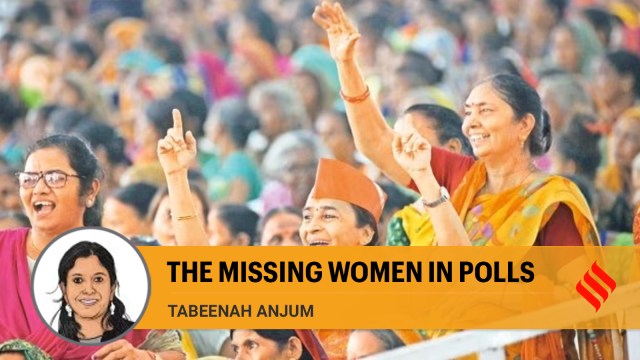
Last month, 56-year-old Shafia Zubair became the first sitting MLA to be dropped by the Congress party for the upcoming assembly elections in Rajasthan. In subsequent lists, while the Congress did deny tickets to some of its other MLAs, it repeated more than 80 per cent of its sitting MLAs, even fielding octogenarian leaders such as Shanti Dhariwal and Ameen Khan, who were facing opposition within the party.
A science graduate, Shafia, the incumbent MLA from Ramgarh, was replaced by her husband and former MLA Zubair Khan in the second list of the Congress, released on October 22. Khan was not given a ticket in 2018 due to his losing streak in Ramgarh since 2008. Shafia won the constituency by a margin of over 10,000 votes in 2018, and, in the last five years, she has been a visible face in the Rajasthan Assembly due to her good oratory skills.
Hers is an apt example of the state of politics in Rajasthan where women may serve as talking points in the election rhetoric but they still lag far behind their male counterparts when it comes to wielding actual power.
The Nari Shakti Vandan Adhiniyam, with its promise of 33 per cent reservation for women in the Lok Sabha and state assemblies, has been a fixture in the speeches of senior BJP leaders in Rajasthan. But the party’s actions in the state fall way short of its rhetoric. The BJP has fielded only 20 women candidates for the elections, a figure that is a mere 10 per cent of the 200 assembly seats in Rajasthan. It is ironic that in 2018, the women voter turnout in Rajasthan was about one per cent more than that of male voters (74.66 per cent and 73.80 per cent, respectively). The Congress party hasn’t set a great example either. It has fielded 28 women candidates, who comprise only 14 per cent of its total candidates. Both parties are nowhere near the 33 per cent representation figure, which would have meant each of the parties fielding women candidates in at least 66 constituencies. The fact that both the Congress and the BJP have failed to be true to their words about women’s representation in politics speaks of the lack of political agency for women in a state which presently records the highest number of rape cases in the country. Women public representatives such as sarpanch or parshad (councillor) are routinely overshadowed by their husbands, who hold the real power and speak for their wives.
One of the main election issues being raised by the state opposition, BJP, is the increase in atrocities against women while the Congress is banking on its women-centric schemes such as free sanitary napkins. But stark reminders of how women’s rights have been reduced to tokenism in the state abound. In 2016, Delta Meghwal, a 17-year-old Dalit girl from the border district of Barmer, was raped and murdered. Her body was discovered in a water tank at a college in Bikaner where she was in the second year of a Basic School Training Certificate course. Meghwal had been the first girl in her village to pursue higher education, encouraged by her primary school teacher father. Her death pushed the women from her village further back in time, as many families were apprehensive to send their daughters to study. This year, in Barmer, Meghwal’s home district, neither the Congress nor the BJP has fielded even a single woman candidate for the Assembly elections. One of the ticket aspirants from the BJP, Priyanka Chaudhary, is contesting as an independent candidate after the party fielded a male candidate from the seat.
Discrimination persists at other levels, too. Even someone like Vasundhara Raje, who has governed the state twice as chief minister, is routinely targeted by political opponents such as Rashtriya Loktantrik Party chief Hanuman Beniwal, who refers to her divorce in his speeches.
While there is no dearth of former student leaders who went on to make it big in politics — the state’s leader of opposition Rajendra Rathore is one such example — women seldom manage to make the leap. In 2011, Prabha Choudhary was elected as the first woman president of the Rajasthan University Students’ Union. It was big news but Choudhary sank into oblivion once the academic session concluded. She does not feature as an MLA candidate from any party, even though some of her male “juniors” from college are now sitting legislators after starting their journey in student politics.
In a state with icons such as Mirabai, Hadi Rani and Panna Dai, it’s about time political parties walked their talk to ensure that adequate representation of women in legislature becomes a reality and not just empty words to gain political leverage.
The writer is a journalist and adjunct professor at Haridev Joshi University for Journalism and Mass Communication, Rajasthan. Her book on Rajasthan politics is forthcoming in 2024